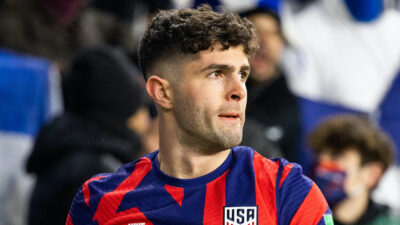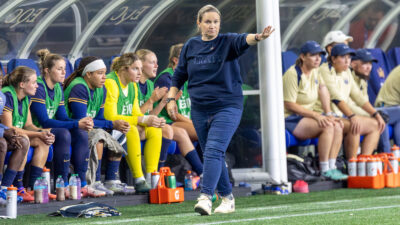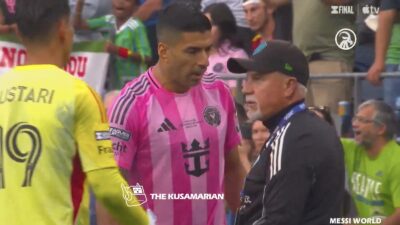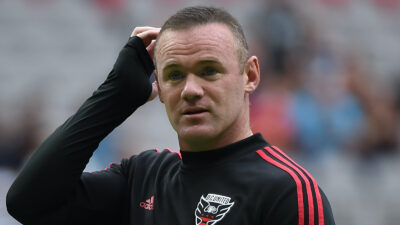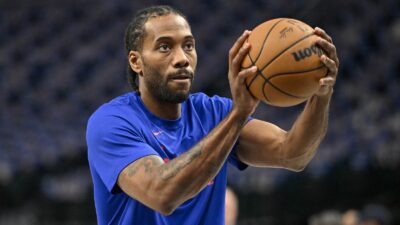 LBS spoke with U.S. soccer player Brandi Chastain this week, the woman who delivered the winning penalty kick to beat China in the ’99 Women’s World Cup. Brandi is representing the Capital One cup which rewards the top athletic schools in men’s and women’s Division I college athletics. The trophy will be handed out at the ESPY’s in July, and they’ll be awarding a $200,000 post graduate scholarship to the winning schools. Stanford and Auburn are the current leaders, and though she’s a Santa Clara girl, Brandi thinks Stanford will probably win it. On the men’s side, she wasn’t as sure but she felt the College World Series outcome would have a major say in what happens. You can visit the Capital One Cup on Facebook and Twitter to cheer on your school.
LBS spoke with U.S. soccer player Brandi Chastain this week, the woman who delivered the winning penalty kick to beat China in the ’99 Women’s World Cup. Brandi is representing the Capital One cup which rewards the top athletic schools in men’s and women’s Division I college athletics. The trophy will be handed out at the ESPY’s in July, and they’ll be awarding a $200,000 post graduate scholarship to the winning schools. Stanford and Auburn are the current leaders, and though she’s a Santa Clara girl, Brandi thinks Stanford will probably win it. On the men’s side, she wasn’t as sure but she felt the College World Series outcome would have a major say in what happens. You can visit the Capital One Cup on Facebook and Twitter to cheer on your school.
As for our interview, we talked about the upcoming FIFA Women’s World Cup which begins next month in Germany.
LBS: The U.S. Women’s World Cup team was recently picked and they’ve had struggles recently losing to Mexico and England. Do you think they’re lacking something? Do they just need more practice time together?
Chastain: There are so many variables that go into being a successful team. There’s also other factors that go into being a winning a World Cup team. I think the games against Mexico and England were eye-openers for the U.S. team, and it’s also relevant to say this tournament is going to be full of jockeying and tactical choices. Those things are really going to come into play more than ever before.
For the U.S. unfortunately losing Lindsay Tarpley over the weekend doesn’t help them, but they also have to take solace in knowing that the players who have been in training camp can step in. They’ve been trained, they’ve been training together for quite some time. I think another factor is can they have some rest before the tournament begins? They play a lot of games with the national team and then they mix in the professional league at the same time. There’s going to be a balance and I think the rest is truly important. I think they may be just a little bit tired, and I think that showed just a little bit in their game against Japan over the weekend.
LBS: If you were doing scheduling, would you scale it back a bit?
Chastain: No, because I think you need the games because to play against yourself over and over again in practice, but you need more. I think it’s the training. Is it once a day? Is it twice a day? Is it weight training on top of that? Is it fitness training as well? I think it’s more training, being efficient in training, but not overdoing training, but you need the games.
LBS: Looking at this team, what do you think is their biggest strength?
Chastain: They have a goal scorer in Abby Wambach who is a force that’s hard to deal with. We had that similarly in Mia Hamm and Michelle Akers. She is just a player that is very difficult to handle. When that happens, things open up for other players to take advantage of.
Like our ’99 team the goalkeeping situation with Hope Solo, she’s a dominating force, she’s super athletic, she can play with her feet, she’s not afraid to be an impact player from the goalkeeper position in terms of being part of a counter attack or being a support system for the backers to play out a pressure. When you have someone behind you who you know can make any kind of save, that kind of gives you a little breathing room. Shannon Boxx has been in the midfield and she has to be the connective force between the backs and the forwards. Being able to stifle attacks, she can set the tone for the way the team is going to defend and the way it’s going to possess the ball.
LBS: You brought up the name Hope Solo, there was the big controversy with what happened against Brazil. Did you think it was the wrong decision to bench Solo in favor of Briana Scurry but she reacted in the wrong way? Did you think it was the right decision?
Chastain: My personal feelings were that Hope didn’t respond well to a scenario that most people also disagree with. But soccer is a game with 11 people on the field and the necessity for the people on the sideline to buy into the objectives of the team. I think it was a great learning opportunity. I’ve been injured many times, I’ve been on the bench, I’ve been cut from teams, and during those moments in my career I really learned about myself and gained perspective about where I fit in on the team and what I can do to help . I think Hope has gained a lot of perspective in a good way and I’m sure she would say she wouldn’t take it back for lots of reasons. I think that will help this team because I think she’s in a place now where she has to be a force that is calm and respectful, yet dominating, and I think that will happen.
LBS: Looking at the teams in the field, who would you say is the favorite to win it?
Chastain: The U.S. is ranked number one, I think they have a legitimate chance like Germany. Brazil, they’re so unpredictable and so technically good and they’ve really imposed their style on the game, I think those three teams. I think also you look at Korea DPR, they are similar to China. And China was devastating because they were so organized and so good it’s scary.
One thing I’m interested in seeing is how there are NCAA Division I NCAA women’s soccer players playing for countries around the world in this World Cup. It’s going to be interesting to see those players playing with their national teams and how they impact this tournament. It’s nice to connect the World Cup with the Capital One Cup and NCAA soccer. To know that what’s happening in collegiate athletics is impacting the world in soccer makes me smile. We don’t go on to make millions of dollars playing professionally but this World Cup will be able to showcase the talents at the Division I level across women’s sports and men’s sports.
LBS: Is this a case where they’re American citizens playing for where their parents are from, or are they playing for countries they’re really from?
Chastain: I think there’s one or two like that, but there’s a player from Stanford, Ali Riley, who’s from New Zealand. Then you have players like Kelly Smith who’s from England but came to the U.S. and went to Seton Hall. You have multiple players that are like that. They’re playing for their own countries but they come to the U.S. and play Division I sports here and they take that knowledge and experiences which go beyond the playing field and into the academic side of things, and they take those home to their teams.

